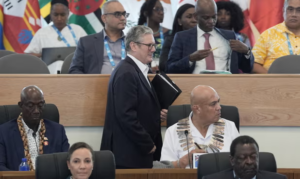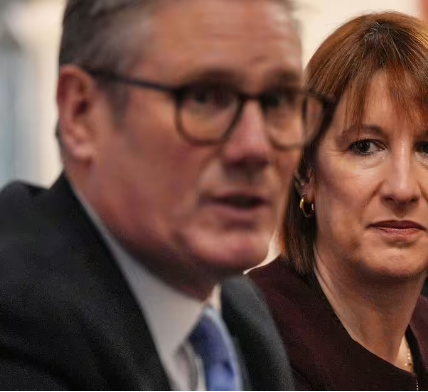No 10 says issue is off the table for Commonwealth summit but other nations are prepared to defy UK

Keir Starmer attends an executive session of the Commonwealth heads of government meeting in Samoa on Friday. Photograph: Stefan Rousseau/Reuters
Labour MPs have urged Keir Starmer to clarify his government’s position on non-cash reparations for Britain’s historical role in the slave trade, as No 10 says the issue is off the table.
In the run-up to the Commonwealth heads of government meeting (Chogm), the government said it would not be issuing an official state apology.
While travelling to the conference, which began on Friday in the Pacific island nation of Samoa, the prime minister told reporters he wanted to “look forward” rather than have “very long endless discussions about reparations on the past”.
King Charles acknowledged “painful aspects” of Britain’s past but sidestepped calls to directly address reparations for slavery, saying: “None of us can change the past, but we can commit … to learning its lessons.”
Despite the insistence from Downing Street that the issue was not on the agenda for the summit of 56 Commonwealth countries, leaders were prepared to defy the UK. A draft version of the final communique that was leaked to the BBC this week said leaders had “agreed that the time has come for a meaningful, truthful and respectful conversation towards forging a common future based on equity”.
Amid mounting pressure, a source in No 10 said the UK could support some forms of reparatory justice, such as restructuring financial institutions and providing debt relief.
This was initially welcomed by the Labour MP Diane Abbott, who sits on the all-party parliamentary group for Afrikan reparations. She said she was “glad that Starmer seems to have backed off from his complete hostility to the concept of reparations. It remains to be seen what he means by ‘non-financial reparative justice’.”
Some campaigners were frustrated by what they felt was either a game of semantics on the issue or a deliberate misrepresentation of what the campaign for reparations is. Part of the long-established 10-point plan for reparatory justice by the Caribbean community (Caricom) is debt cancellation, while others have long campaigned on the link between reparatory justice and climate resilience.
Michael McEachrane, the UN rapporteur of the permanent forum on people of African descent, said: “Keir Starmer misrepresents reparations … It is a matter of taking responsibility for and transforming legacies of the past in the present.” Only then, McEachrane added, would the Commonwealth community see “greater equity within and among countries”.
When No 10 was pressed to explain what it meant by non-financial reparative justice in Friday’s press briefing, a spokesperson pushed back on the idea. The prime minister’s deputy spokesperson said: “Our position on reparations is clear, and that goes for other forms of non-financial reparatory justice too. The prime minister’s focus is on addressing the challenges that we face.”
In response, Abbott said: “Incredible that Starmer wants to treat the leaders of fellow Commonwealth countries with such disrespect. And it is offensive that he seems to be saying that he knows what they want to discuss better than they themselves do.”
Another Labour MP, Clive Lewis, questioned how Starmer and his team could have gone to the summit and not expected reparations to come up. “Has he not been paying attention to the African Union, Caricom, [the Barbados PM] Mia Mottley, the Bridgetown Initiative? This is what has been happening whilst he has been in politics,” he said.
“It looks very much like they’ve said, in a very kind of colonial mindset, that this is not for discussion. It’s not on the agenda. Well, that’s not going to go down well in a Commonwealth of equals.”
Lewis, who called in parliament for the UK to enter into negotiations with Caribbean leaders on paying reparations for Britain’s role in slavery, said: “You have to ask the question, given that David Lammy [the foreign secretary] himself is a son of Guyana, who has been talking about this for years, the person who came after Bernie Grant: someone lost a memo somewhere.
“I can’t believe that David didn’t know that this was going to come up, and someone must have told No 10 this was coming up … it is quite revealing of something.”




